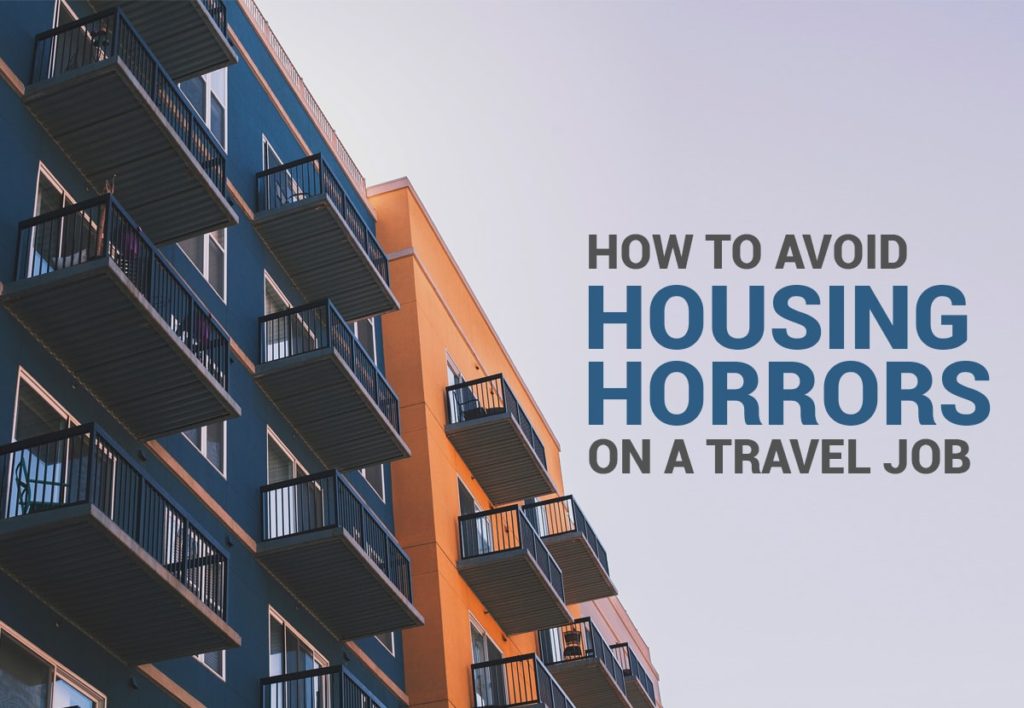
How To Avoid Housing Horrors on a Travel Job
Most of the time, a traveling healthcare professional will have a smooth transition when it comes to travel assignment housing, moving into a clean, safe place to stay in a good location without a hitch. Of course, as with anything else, occasional bumps in the road can happen, but there are ways to make that less likely.
There are generally two different scenarios for travel assignment housing. Either you’ll receive a stipend and make your own housing arrangements, or the travel staffing agency will arrange it for you, giving you one less thing to worry about. Generally, it’s best for a first time healthcare traveler to secure housing through the agency, if possible as it can make the transition much less stressful and time consuming. Once you’ve become a seasoned traveler, you’ll have a better idea of what works best for you.
Agency Placed Housing
There are many benefits to agency placed housing. You won’t have to worry about getting the utilities turned on, paying deposits and so on. Your agency is also likely to have more connections, which can make it easier in places where it’s harder to find housing. Oftentimes, the agency will get a better rate too, especially if there are other traveling healthcare professionals at the same property.
If you’ve chosen this option, to avoid issues, be sure to ask your recruiter before you leave for your assignment what your accommodations will be like. In some cases, there may be a dedicated housing team to speak to. Either way, be sure that you know who to contact if any problems arise. If you have a pet and plan to take your furry friend with you, inform your recruiter right from the start so that pet-friendly housing can be secured. It’s also important to make sure your expectations are aligned with the reality. Where you’re going can make all the difference. Say, you’d love to live in a high tech, high-rise apartment building, but you’re going to be working at a facility in a small town in Nebraska – do your research before accepting an assignment if that’s what your heart is set on, to learn what the most common type of traveler housing is in the area.
Before you go, you may also want to Google directions from your housing to the facility where you’ll be working to get an idea of your commute, as well as check out places like restaurants, grocery stores, shops and attractions in the area. This will help you be much better prepared for what awaits when you arrive. When you do arrive, if there are any issues with your housing, missing amenities, problems getting something to work, safety concerns, or something else, reach out to your agency contact right away so that he or she can make arrangements to get it corrected. While it goes without saying, if they aren’t aware, they won’t be able to fix it.
Where to next? Click here to get information on allied travel jobs
Housing Stipend
For an experienced travel therapist, travel pharmacist or any other traveling healthcare professional, a housing stipend can be a good way to go, especially if they have an RV they travel in, or plan to live with friends or family in the area. Some travelers simply just want to choose their own housing, and enjoy the flexibility of arriving earlier, getting more time to settle in. There are a number of downsides, however, the primary being it can be difficult to find a place to rent for just three months at a time, especially one that is furnished – and, if you have a pet, that can make things even more challenging. Short term leases often come at a higher cost, and you’ll probably have to pay an application fee and a deposit. In some cases, utilities require that too.
If you’ve decided to take the housing stipend, location is arguably the most important thing to consider for avoiding housing horrors. Keep in mind that in areas with lots of traffic, a commute that seems short, perhaps 10 miles, could take 45 minutes because of traffic. On the other hand, housing that’s very close to the facility may be in a neighborhood that isn’t all that safe, so perhaps venturing out just a few miles can be the sweet spot. Do a Google search and check out crime statistics, or, even better, get onto a site like Nextdoor.com – on this neighborhood social network you can ask questions of those who live there already. It’s also a great way to connect with others once you arrive.
